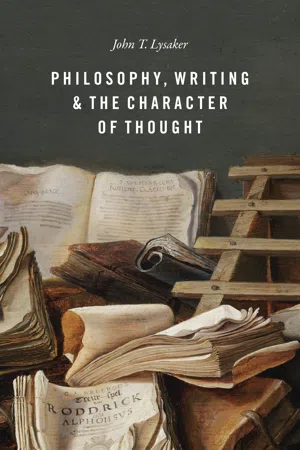
- English
- ePUB (mobile friendly)
- Available on iOS & Android
Philosophy, Writing, and the Character of Thought
About This Book
Lysaker examines the relationship between philosophical thought and the act of writing to explore how this dynamic shapes the field of philosophy. Philosophy's relation to the act of writing is John T. Lysaker's main concern in Philosophy, Writing, and the Character of Thought. Whether in Plato, Montaigne, Nietzsche, Wittgenstein, or Derrida, philosophy has come in many forms, and those forms—the concrete shape philosophizing takes in writing—matter. Much more than mere adornment, the style in which a given philosopher writes is often of crucial importance to the point he or she is making, part and parcel of the philosophy itself.Considering how writing influences philosophy, Lysaker explores genres like aphorism, dialogue, and essay, as well as logical-rhetorical operations like the example, irony, and quotation. At the same time, he shows us the effects of these rhetorical devices through his own literary experimentation. In dialogue with such authors as Benjamin, Cavell, Emerson, and Lukács, he aims to revitalize philosophical writing, arguing that philosophy cannot fulfill its intellectual and cultural promise if it keeps to professional articles and academic prose. Instead, philosophy must embrace writing as an essential, creative activity, and deliberately reform how it approaches its subject matter, readership, and the evolving social practices of reading and reflection.
Frequently asked questions
Information
Index
Table of contents
- Cover
- Title Page
- Copyright Page
- Dedication
- Contents
- Gambits and Gambles
- Iron Filings
- Pardon the Interruption
- Content and Form
- Form and Content
- In the Beginning Was the Deed
- Reworking Making
- Deliberate Writing
- Mistaking Instrumental Reason
- Fits and Starts
- A Cultivar
- Quotation beyond Quotas
- For Examples
- In Nuce
- Irony
- Message in a Bottle
- The Hour of the Wolf
- It’s the Gesture That Counts
- Furnishing the Space of Reasons
- A Struggle with Ourselves
- Who’s on First
- Every One Is Everybody
- The Secret Addressee
- When We Undo Things with Words
- Unknown Friends
- Resoundingly Reticent
- Provocation/Demonstration
- Among the Pros (and Cons)
- A: “O my friend, there are no friends.” B: “At least we’ve got each other.”
- Then Came History
- Equal to the Moment
- Unequal to the Moment
- After Beauvoir
- Property Is Theft
- Strange Alchemy
- Public Commitment
- Propagation without Propaganda
- Bit by Bit
- Taking Stances
- Character Studies
- Where Do We Find Ourselves?
- Acknowledgments
- Notes
- References
- Index